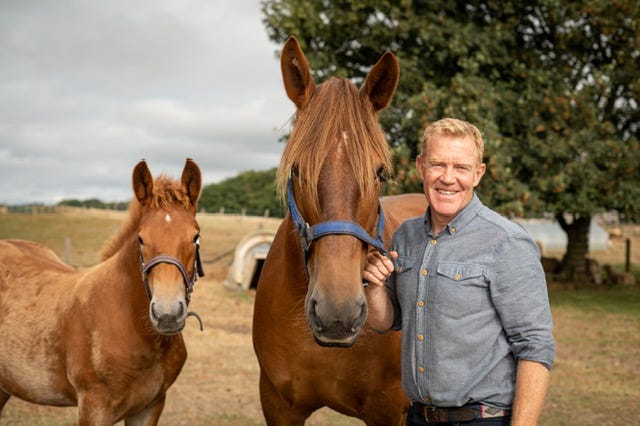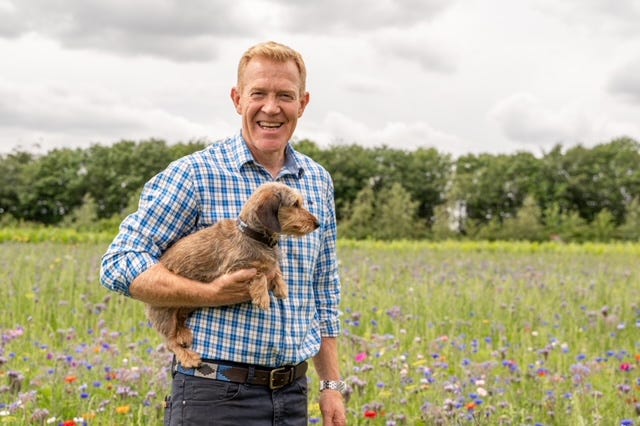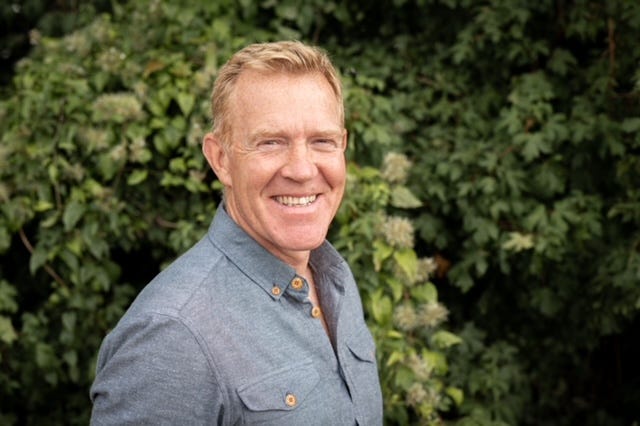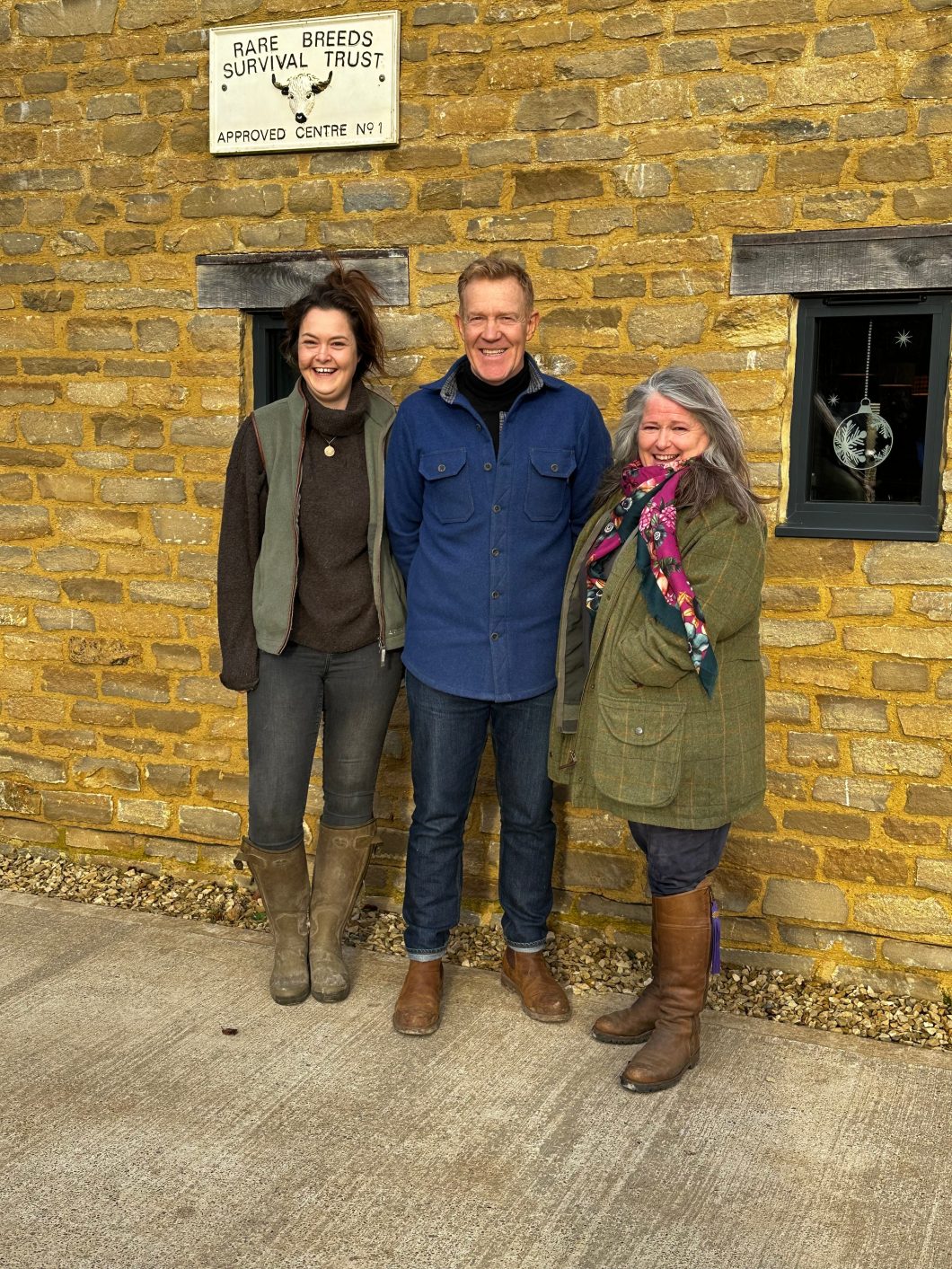As we approached Cotswold Farm Park to interview Adam Henson, there was a slight nervousness playing on both Holly’s and my mind. He’s been interviewed many times before, as co-owner of Cotswold Farm Park and in his role as a Countryfile presenter, so he’s probably heard or been asked most of the questions in the book!
But luckily, we both tend to adapt our questions according to the conversation that develops and Adam speaks eloquently on many topics, so our conversation flowed and if any of our questions bored him, he was far too much of a gentleman to show it.
Adam Henson was born and brought up on Bemborough Farm, a Corpus Christie College owned tenanted farm which is now his family home, along with his wife and two children.
His father, Joe, grew up in London, son of famous actor, Lesley Henson, who set up ENSA and entertained the troops during the war. Joe however had acne and a stammer, so the stage was the last place he wanted to be, although his younger brother, Nicky, did take to the stage. In contrast, Joe discovered a love of farming as a boy, went to the Agricultural College in Cirencester and his subsequent career saw him achieving the role of Farm Manager.
1962 saw a life changing move when Joe took on the tenancy of Bemborough Farm with his old school friend, John Neave, and together they ran a commercial farm; mixed beef, sheep, and arable.
Adam says, “Dad started collecting rare native and ‘old-fashioned’ animals, some of which he saw were becoming extinct and thought it was important to preserve them. He ended up with quite a large collection, so to showcase this rare breed collection, he decided to open to the public.”
Joe got planning and permission from his landlord to open Cotswold Farm Park in 1971, and then worked with zoologists, geneticists, scientists and other farmers, founding The Rare Breeds Survival Trust, of which he subsequently became Chairman. Since the founding of the Trust, no further rare breeds have been lost.
Adam remembers the early days of the Farm Park, as a child his favourite place to be was being with the sheep and out and about on the farm. He says, “The Cotswold Farm Park opened up when I was 4 or 5, I remember chasing my Dad out of the door from a very young age, I’d always wanted to be a farmer! I remember shearing sheep, helping with lambing at 2am in the morning and falling asleep in class because I’d been up all night!”
Young Adam attended Seale Hayne Agricultural College and then headed over to Australia and New Zealand, working on farms and travelling with his college friend, Duncan Andrews. When he returned to the UK, he worked as Assistant Stockman and Livestock Manager and then eventually took over running the whole business.
Adam recounted, “With all the Cotswold Farm Park, our shop, cafe, arable and livestock, there was an awful lot to keep on top of!”
Meanwhile Duncan had left his job at the Agricultural Mortgage Corporation and moved to the Isles of Scilly and taken on a farm tenancy with his wife.
Adam and Duncan kept in touch, and after a time, knowing that two heads are generally better than one, Adam met up with Duncan and asked him if he wanted to return to the UK and join him in the business. Duncan agreed and after working for Adam for 2 years, he bought into the business.
Together they came up with a business plan to drive the business forward and as Adam recounted, “Since then the business has gone onwards and upwards, we’ve had difficult times – Foot and Mouth and then Covid – but that’s the shining light for me, surrounding yourself with people who can complement your own skills and drive the business forward”

Wise words there from Adam and it’s obvious that this powerful partnership has had a positive effect on the business with visitor numbers rising from 20,000 per year to 180,000; the addition of a holiday site with lodges, glamping and camping; a retail outlet; bar and restaurant as well as the extension of the season into what traditionally would have been the quieter months. Alongside that they farm 650 hectares of land and carry on Joe’s legacy of supporting rare breeds.
Diversification of the farm to attract multiple income sources can sometimes be a thorny issue, particularly between the generations, but when we ask Adam about that, it’s obvious that the seeds his father sowed with the Cotswold Farm Park when Adam was younger are important to him and he always has them in mind as the business grows.
In many farm businesses, there can be a tendency for all the business transactions like meeting the Bank Manager to be handled by the “parents” and for that to continue for much longer than it should, so when the parents move on, the new generation managing things are woefully ill equipped to handle the business side of things.
But Adam’s father had prepared him well, and now, with a trusted business partner in Duncan, he still has someone to share his worries and successes with.
“Some people work with a Manager or an external Consultant, but I chose to work with a trusted business partner.
Duncan and I have looked at the areas that are more profitable and more sustainable and invested and improved the infrastructure and systems, as well as staff and people”
Their decision to recruit managers who are excellent in their roles, (now numbering 13 full-time managers and 100 staff) brought in the capability for the company to push for continued growth.
This set-up means that Adam and Duncan are working on the long-term future of the business and they have a team who run the day to day business for them – which is an exemplary way to have things structured in a larger business aiming for long term business growth.
In addition, since 2001, Adam’s career as a presenter on Countryfile has provided a valuable income stream for their early investments, a great grounding in rural issues and honed his communication skills.

Next we wanted to find out, requirements of the job aside, what Adam’s idea of a perfect few hours would be…
“I really enjoy working with livestock, so, if I could be out there working my sheep with my dog, Gwen, that would be just lovely!”
Part of our mission here at Countrywoman’s Guide is to show the reality behind the stories that you usually hear, so we always ask where people feel that they have had to be really tenacious in order to get where they are now.
“There’s been lots of difficult times really, and we all know that behind the face there’s always some back story, at various different scales.
For us, Foot & Mouth was a really hard time, we were tenants of the farm and we were heavily invested in Cotswold Farm Park, as we’d borrowed a lot of money, on top of our heavy overdraft, to push forward the business forward.
We did that in 1999/2000 and then in February 2001 foot and mouth hit, it was horrible, and we were in trouble – the farm closed, the bank was closing in on us, as was our landlord. We sat around the kitchen table with our wives – all our assets were tied up in the farm, if we lost the business, we lost our houses and our livelihoods. Luckily, we had a small insurance policy that came through and saved us at the last minute and then I got a job on Countryfile.”
That whole episode prompted the business partners to strip out as much risk as possible and to concentrate on the areas that gave a profitable income stream. In time, those learnings became a strength when Covid hit, again closing the farm and creating cashflow issues.
Adam remembers,
“On the Monday the government closed the country down and I thought that was it! I found myself doing a video on social media saying, “I promised my Dad on his deathbed, I’d look after his legacy and we’re going to lose the lot”, that was my genuine emotion at the time.”
But furlough, reduced VAT and the ‘Eat out to help out’ scheme as well as starting to do takeout food when they could, provided a much needed lifeline and the holiday side of things boomed once the country was open again.
Throughout our interview, Adam wears his heart on his sleeve and feels that his open and honest relationships with his family and business partner have provided him with a real support network.
But in agriculture as a whole, we know that it’s sometimes very easy for people to feel lonely and unable to talk to others when they are down and this is something that Adam is very conscious of.
“I lost a friend who died by suicide five years ago and I never saw it coming, which really shocked me. Then reading about the high suicide rate in the Agricultural press, inspired me to talk to Team Doctor and we came up with the idea of a series of podcasts, Keeping on Track. We wanted to make it accessible and include farmers speaking to farmers.”
The poignant fact that Adam shared with us was that, the overriding thing that came from all the interviews was that it was the ability for these individuals to go out and find someone to talk to that made the difference. They all said that once they spoke to someone and shared their worries and got some help, it had made a world of difference. He said,
“It made me think, all of us need to recognise that in one another. Some of the good things in the podcast are what to look for in a friend so that you can notice a change – are they clean, are they smoking or drinking more, are they eating – that sort of thing.”
Adam went on to recount how Olly Harrison of Olly Blogs Agricontract told him how he asks people how they are as a percentage or out of ten, and Adam now does that with his family or the team at work – and it can help flush out if there are issues that need further attention.
It’s obvious that when we ask the “How are you?’ question that is so endemic in our culture, we all maybe need to tune into the answer a little bit more than many of us do currently.

We talked to Adam about the differences in the workplace environment experienced by Holly and myself at our different ages, and how businesses these days need to tune in to their employees more. Potential employees don’t just consider the role any more, workplace culture is hugely important now as well.
He said, “I think there’s a huge amount more, we, as employers can do. It’s not just about money, it’s about the environment our team work in, the people they work with, it’s about having a nice staff room, concessions in the cafe and a staff party – there’s so much more to it.”
Through the podcast, Adam connected with someone from Oxford University on the subject of health and well-being. From that he’s learnt that many things impact how we feel in everyday life. Things like relationships, nutrition, exercise, sitting position and even sleep can have a massive impact on people, which then have a knock-on effect on the issues that you have going on at work.
It sounds like these are really basic things, but actually if you do a mental tick list against these things yourself, it’s surprising how many of them you might not be giving full attention to. Think about Red Bull fuelled late night working and fast food grabbed on motorway drives…
These are things that you practice self-help with, but Adam went on to point out that the visibility of mental health is a problem, “If you’ve got a broken arm, it’s obvious, but if you’ve got a broken head, it’s quite difficult to see or even describe. It’s only quite recently that we’ve started opening up and talking about things.”
However, the traditional ways of the countryside hold a mechanism for us to make that connection, Adam recounted, “As Nigel Slater said some years ago, – the value of sitting down and having lunch together is important – phones off and good quality time together.”
We all agreed that it’s important for employers to consider this as the provision of things like having somewhere for staff to sit and have some decent food, can also provide an opportunity for conversations that help to happen.
Adam went on to explain that it’s difficult to talk about farm issues at a dinner party, so the markets and traditional farm gatherings are important gateways into the lower levels of support that can be taken from a conversation, where you realise that you’re not the only one having weather issues, for example!
Adam’s eighth book, Christmas on the Farm, was a real trip down memory lane for him,
“When we first talked to the publishers about it, I thought, is there enough to talk about? But, actually then you start thinking about it and remember all the Christmases of my childhood, the animals we’ve had, the presents we’ve had, and then come some of the challenging and difficult times. I talk about when my wife had pancreatic cancer, and how difficult that was and it kind of made me go almost back in a diary way and remind myself about what had happened.”
As one of our last questions, we asked Adam, “What do you want your legacy to be?”
“I would love, if I could, (along with lots of other people) to get agriculture, land use and conservation back into education. One of my soapboxes is that we learn about history and religion, but we don’t learn about land use and where our food comes from. I took some sheep to a school in the North of Birmingham in a very deprived area, and from talking to the teachers, I learnt that when the school dinners provide a more balanced diet, concentration, behaviour and learning ability improved.”
When we add that Adam went on to say that taking two sheep into the assembly at the school caused a huge commotion because a huge percentage of the children had never seen a sheep in real life, it really brings home how much of a gap there is in knowledge out there, as he says,
“We don’t understand land use, we don’t understand how food is produced or what we’re consuming – something like 80% of food consumed is highly processed and we have an obesity problem as a nation as a result of it.”
The financial benefits of educating people in this area are potentially huge, but Adam makes a good point, “how can people make an informed choice about their diet or farming matters, if they don’t even know that a potato comes out of the ground? How can people be more sympathetic about farmers when they don’t even know what we do?”
It’s clear that there is still much to do in all of the areas that we chat about, but Adam is clearly a man on a mission and determined to ensure that he uses his platform for good, to raise awareness of mental health issues and to educate more people about land use and conservation.
Creating a legacy seems to be a family trait for the Henson family and we have no doubt that another Henson legacy is in the making under Adam’s stewardship, and an important one at that!
We always ask our guests for one piece of advice for you, our readers, and here’s Adam sharing his very sage advice in response.
You can also find Adam on instagram here and on his popular YouTube channel here

